I am providing a little commentary on the Carnivore Dietary approach that has lately caught some people’s attention. This does not mean that I am promoting a Carnivore Diet for everyone. Several people in my practice are utilizing a carnivore diet as an interventional diet to address medical conditions and symptoms. Still, the vast majority are not on this dietary prescription. It is important to eat according to one’s individual needs.
There has been some buzz recently in little ‘ol Burke County regarding implementing the “Pig Rig” that provides smoked meats to public school students. This has been written about in the local paper, even in the Charlotte Observer, and received national attention with a big push from the Physician Committee For Responsible Medicine (PCRM) calling for it to be shut down. The claims are that “meat is bad”; the smoke contains carcinogens that increase the risks for cancer, and they cite the declaration from the WHO that red meat and processed meats are as dangerous as smoking cigarettes and should be avoided.
First, the PCRM is a group of Vegan advocates (Less than 7% of its organization is physicians) with one singular goal – eliminating all meat consumption. They are vegan propagandists with an agenda. We need to understand that so we can then fully appreciate the stance they are coming from. This is not about science and evidence but about animal welfare, the environmental impact, and eating meat. None of their arguments hold up when looked at with scrutiny. Ask any regenerative farmer about their livestock’s benefits to the environment, enriching the soil and allowing for improved crop growth. Look at the data on mono-crops (corn, wheat, soy) and the amount of water necessary to maintain these crops compared with the amount needed for each steer, pig, or chicken. If you review the data on the emission of greenhouse gases from cattle compared with everything else (cars, factories, etc.), the poor cattle do not even come close. Each argument provided is a loss when looked at closely and when not provided as a one-sided discussion.
Another fact about PCRM is that they are the organization most responsible for adding a massive amount of Trans Fats into the human diet. McD’s restaurants used to fry their french fries in beef tallow – an incredibly heat-stable fat that did not oxidize (become damaged) at high temperatures. PCRM staged large protests against their use of tallow, having strong lobbying efforts in Washington D.C., and managed to get the fast food giant to switch to using Soybean Oil (plant-based) instead. The interesting thing here is that soybean oil is volatile when exposed to heat and becomes trans fat. This has been one of the strongest dietary links to the increases in rates of obesity, diabetes, and heart disease over the last 2 decades. Having recognized their “mistake,” they then proceeded to petition the government for regulations banning the use of trans fats and to force restaurants, and other processed food manufacturers, to discontinue the use of soybean oil. Hello CANOLA!!!
The World Health Organization has always had a slant toward plant-based diets, and it should come as no surprise that they would put out information, based on observational (survey) data, that meat kills. When looking at the data, again, with some scrutiny, the difference in lifespan between those consuming red and processed meats vs. those that were not was around 6 days. What would I do with that extra week of my life? Probably eat more bacon!
So Harvard recently conducted a study (again, observational, but they are very clear to point this out – since it suits their agenda – Harvard Department of Nutrition also supports plant-based diets). The conclusions from the study seem to contradict the general consensus that meat is bad for you, yet their commentary speaks volumes about what they believe and want you to believe.
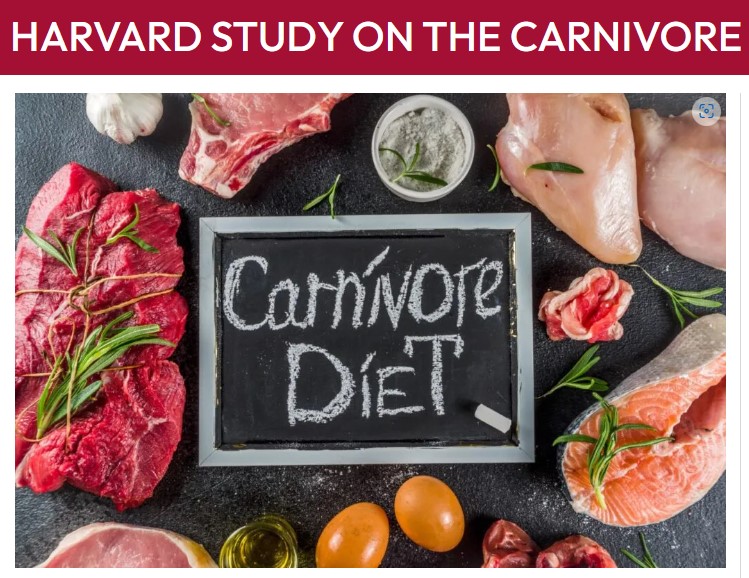
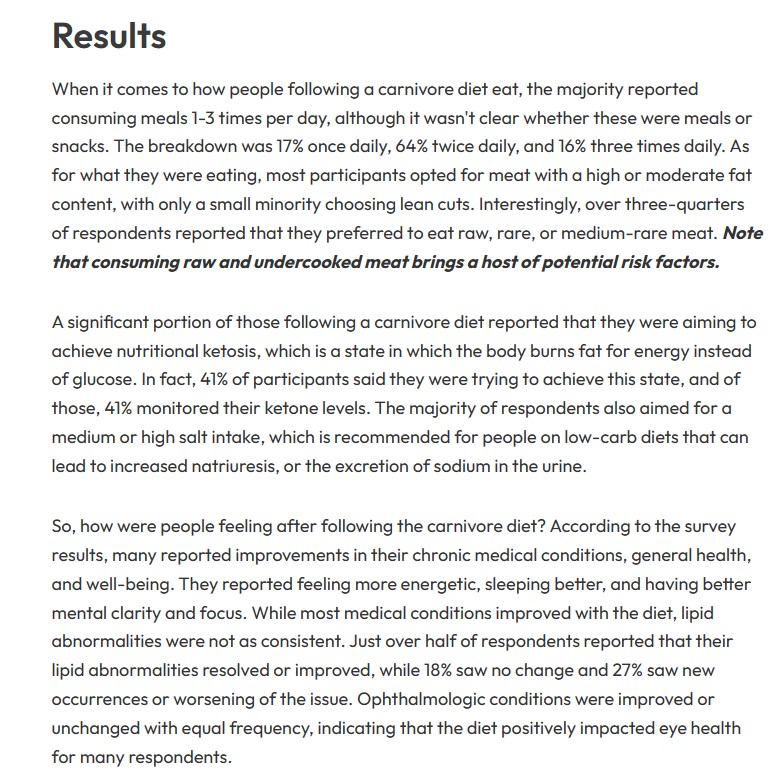
“Many reported improvements”… actual statement should state “Most reported improvements, as you will see from their stats below.
While most conditions improved (more energy, better sleep, better mental clarity), their lipid abnormalities were not as consistent – yet, if you read into the study, they did not perform any labs; these were online survey questionnaires about their diets, symptoms, and labs for those that reported them, and “no objective measurements were obtained”. And this is where lipidology gets interesting and something we address routinely in the office. It gets tiresome to hear the mantra “LDL Bad -HDL Good” as if it is this simplistic. If your HDL rises, Triglycerides come down, but your LDL goes up as well; this is very concerning for those still practicing medicine from the 20th century.
So here is the actual data from their study… The light grey is “Better,” the Gray is “Unchanged”, and the black is “Worse”. The percentage of reported improvements is staggering – no other diet can claim this degree of change. It is a 65-95% improvement on every parameter they measured. This does not include changes in labs (objectively measured, as we do in the office), or assessment of specific conditions such as autoimmunity, diabetes, irritable bowel syndrome, inflammatory bowel disease, obesity, migraines, and others that I have personally witnessed in my practice with dietary changes, but also from communication with other colleagues in functional and integrative medicine practices. I would like someone to explain objectively how this is a “Bad Thing”, without the plant-based, save-the-world spin.
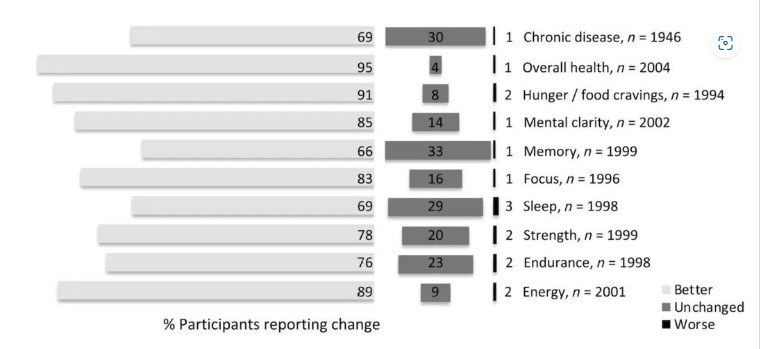
So how do they close out their study report? What are their conclusions from data that show greater improvements in symptoms and conditions than most medications being prescribed daily?
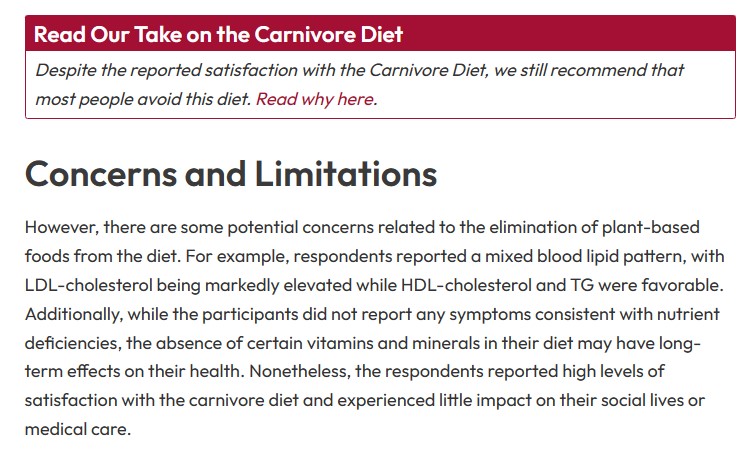
Ah, they may have nutrient deficiencies, even though they have no symptoms to suggest nutrient deficiencies, and the fact that most of their symptoms improved dramatically while eating this way is merely a masking of the real underlying problem of occult nutrient deficiencies. It all becomes clear now. A plant-based is healthy and provides the body with everything it needs, but a meat-based diet offers only nutrient deficiencies that will lead to long-term effects on their health. This is what we refer to as speculating — we do not like the results and were hoping to prove this dietary approach is dangerous, but it did not play out that way, so now we are going to make up statements to help support our beliefs.
My conclusions:
- Not everyone needs to nor should follow a carnivore diet.
- The choice to follow a carnivore diet, which often includes a variety of plant-based foods (by the way), may confer significant benefits to countless health factors. A trial of this approach for a limited time can yield great results, or you may determine that it may not be best for you.
- Most people can and possibly should incorporate a variety of plant-based foods.
- Meat is not bad simply because an organization says it is.
- Animal meats are loaded with nutrients, some of which cannot be easily obtained from plants.
- Most nutrition studies are “Observational,” meaning they are based on survey questionnaires (what did you eat last Tuesday) or the following of a group of people for a series of weeks/months/years and assessing for the development of any conditions associated with whatever specific data point they are studying (i.e., diet, exercise, etc.) but without direct intervention and randomization of this population (humans are not rats that can be easily manipulated into making changes through 100% control of their environment). This limits their utility for proving any causation between food and disease processes. Correlation Does Not = Causation. The next step would be an RCT trial — anyone willing to be locked away for 20 years in a Biodome so I can control every aspect of your life (diet, exercise, day/night, sleep, etc.) please let me know, and I will get you enrolled into our pilot study.
- Regenerative animal farming does not destroy the environment, is not contributing to global warming, and does not lead to increased land desertification. Look no further than mono-crops (heavily subsidized crops) for these issues. And we should have our attention diverted from the things that are actually contributing to these concerns – like big agriculture, factories, and cars/trucks. This would be an inconvenient truth, and blaming the cows and the farmer is far easier. Ignore the obvious; there is nothing to see here.
- Processed foods are BAD! Let’s not take our eyes off the elephant in the room. Every new restaurant being built in my county, and many surrounding counties, is a highly processed food facility. Chicken places, Taco places, burger joints… many of these “foods” served could not be any further from the natural source they once came from—canola oil in the fryers, pesticides in every meat and grain, along with several synthetic chemicals for added flavor and texture.

We monitor labs, body composition changes, symptoms, and medical conditions regularly and longitudinally. I see the results achieved from vegan, vegetarian, Paleo, keto, carnivore, and the Standard Western Diet. We make changes when needed – sometimes backtracking, sometimes advancing. Each individual is an N=1 research study. There is no one on this planet just like anyone else. There are generalizations that can be made, but from there, we still need to individualize them.
As I mentioned, I have individuals following a carnivore diet in my practice. I have identified nutrient deficiencies that needed to be addressed. For some, this was through supplementation; for others, it was through reintroducing foods for specific nutrients. I have found the same types of deficiencies in those on plant-based diets as well as omnivorous diets. Nutrient requirements are not just about what you are eating – it is about what you can absorb and what your body needs based on other factors like activity levels, sleep quality, stress levels, and more.
A 6-month study on any dietary approach is limited and offers indications of benefit or harm but is by no means definitive. To see significant improvements in such a short time is excellent. What does that suggest about the healing process and reversal of disease? Can we really rely on lab results in such a short time frame to be indicative of a dietary failure? I am feeling so much better. I better stop what I am doing. It is killing me! It takes decades for diseases to develop and manifest and for lab results to become abnormal, but 6 months is all you need to determine if something is good or bad?
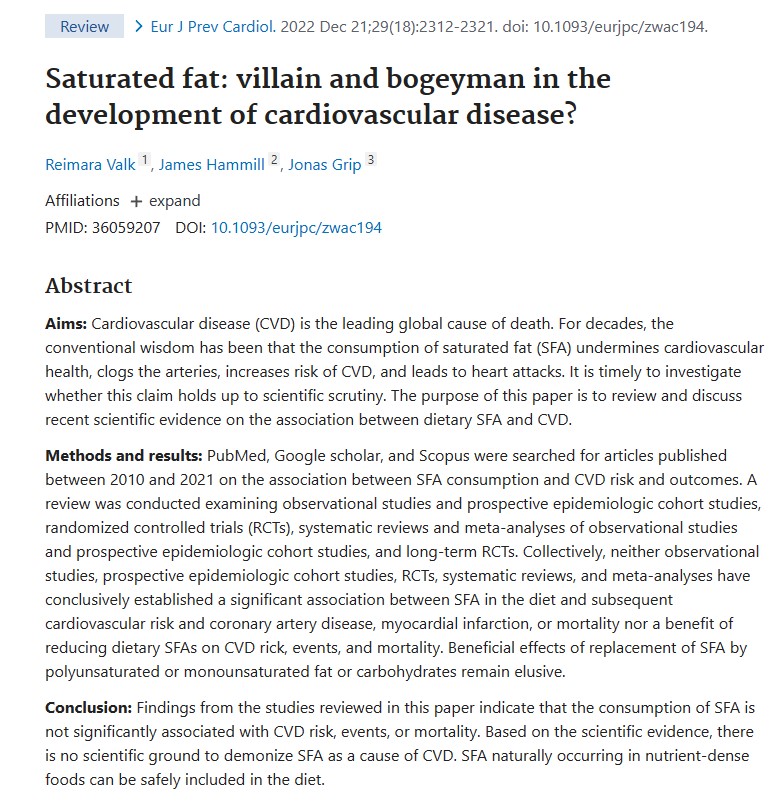
Burke County, NC, is blessed with amazing resources. There are many farms with grass-fed cattle, pastured chickens, eggs, and pork. You can even find some with goats, ducks, and other animals. You need not look far to find one with healthy meat options. One of our favorites is Blue Bird Farm right here in Morganton. There are others speckled throughout Caldwell, Alexander, and Catawba counties as well.
The point of this post is not to promote eating only meat or primarily meat. That is a personal decision and one that should be made between you and your medical provider (feel free to let me know how that works out). The point is to make it clear that meat is not deadly and evil – but rather something that humans have consumed throughout our entire existence on this planet. Feel free to eat 90% plants and 10% meat or 10% plants and 90% meat. Many other things contribute to disease, degeneration, and loss of our healthspan, resulting in the decline in our health and well-being. Someone’s personal agenda should not be what we base our decisions on.
Find yourself a functional medicine or integrative medicine physician and obtain the types of evaluation and testing that can give you answers toward truly improving your health, longevity, and health span.
I hope you found this helpful. This is not medical advice and is for information purposes only. Medical advice and management of any conditions needs to be obtained from your healthcare provider.
